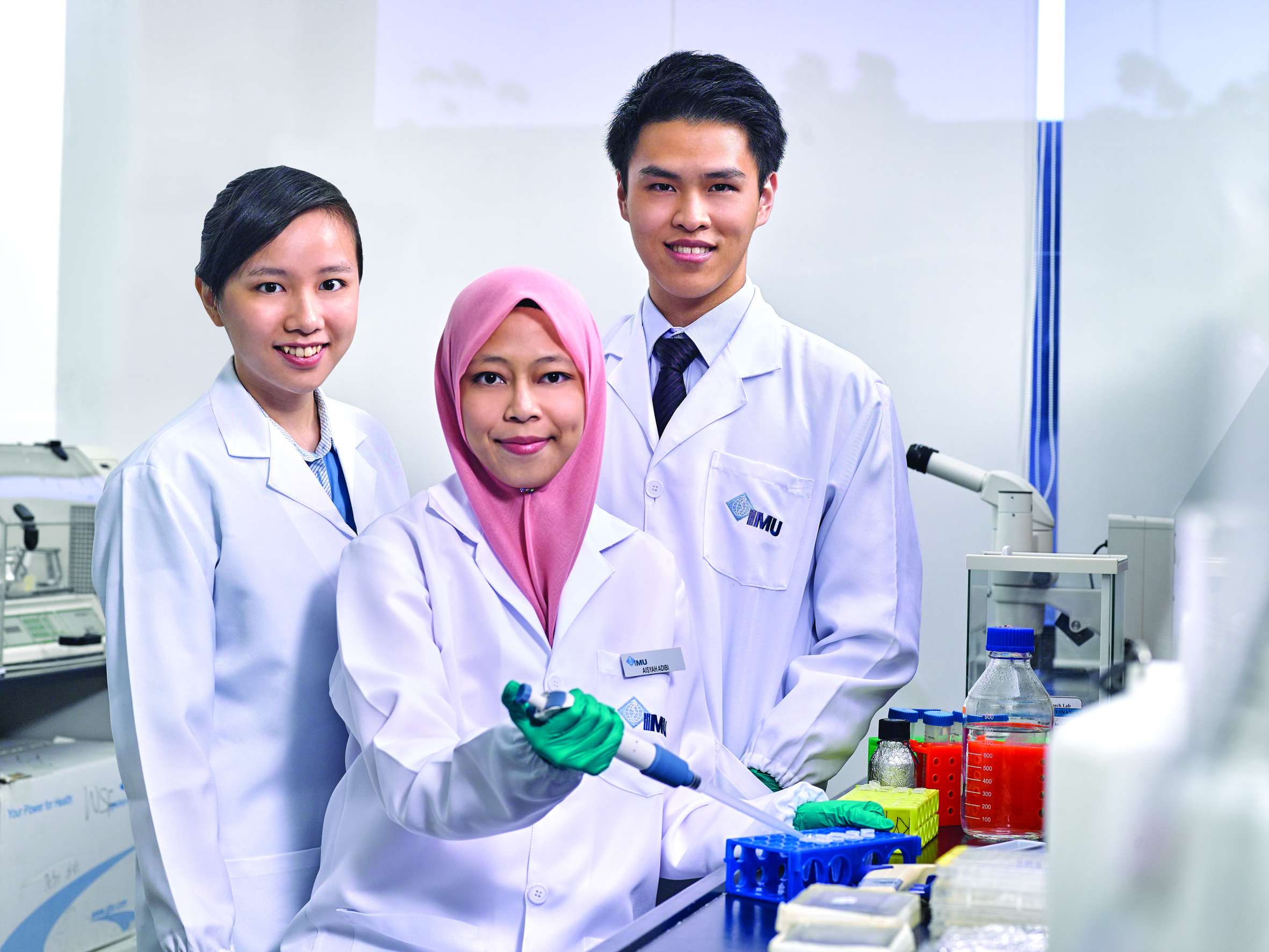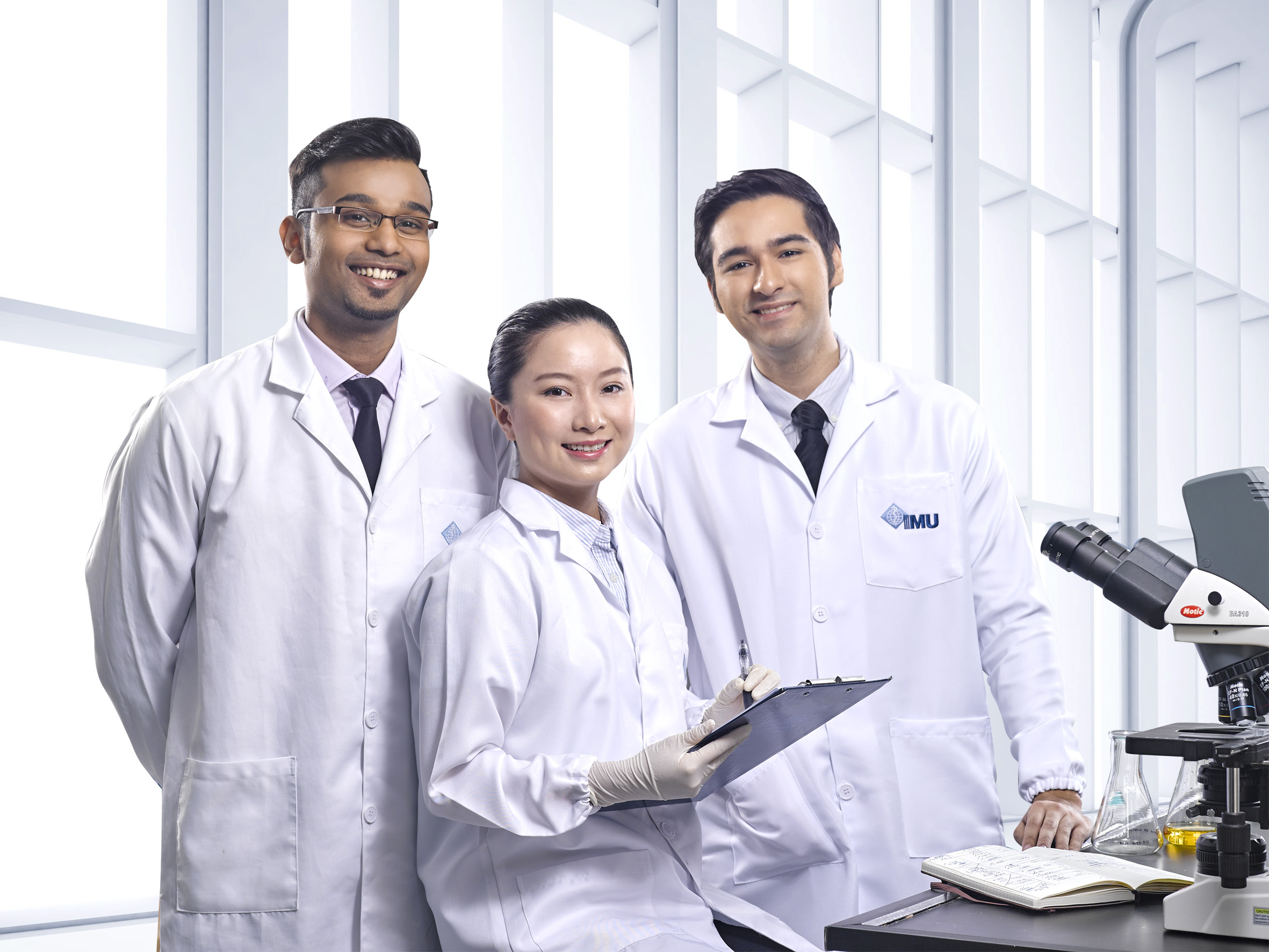What is the building block of life? How are dengue and Zika similar? Why is cancer so complicated?
These questions were foreign to some of us thirty or maybe forty years back, but with ample amount of information being relayed in social media, these curious topics can be as close in piquing our thought process, perhaps as Elon Musk’s SpaceX projects. The field of applied medical sciences have progressed so much through the years in all their outlets, with each capable of sprouting branches of their own. The Head of Division of Applied Biomedical Sciences and Biotechnology of IMU, Dr Anna Ling Pick Kiong shares with us some of her thoughts on the career prospects of fresh graduates and tidbits regarding the field that she passionately works in, alongside the Programme Directors within the Division.
| The Division itself comprises two Bachelor of Science (Hons.) degrees, namely Biomedical Sciences (BM) and Medical Biotechnology (MB). “Given their very similar names, I think we can put it simply as Biomedical Sciences is the study of cells up until the systems level within the human body to understand and treat human diseases,” Dr Ebenezer Chitra said as the Programme Director of Biomedical Sciences programme. “Medical Biotechnology, on the other hand, is a subset of biotechnology that teaches us how to utilise all living organisms to generate products, be it vaccines or natural compounds to aid us in prolonging life, and hopefully achieve a more productive one,” added Dr Kok Yih Yih, the Programme Director of the Medical Biotechnology programme. |
Career prospect is of course, one of the concerns of both prospective students and parents, thus it is of the utmost importance to understand the various career outlets graduates of these courses can obtain. “Graduates of the BM programme would be accustomed to run diagnostic laboratory procedures, such as body fluid or tissue sample processing, a career path which could be secured within 3 months upon graduation by our graduates in companies such as Alpha International Fertility Center as an embryologist and Maldives Hospital as a haemotologist. Aside from these, medical laboratory technologist jobs are also abundant in the list of career paths made by our graduates in Subang Jaya Medical Center, Tropicana Medical Center, as far as Medical Research Council of Gambia.”  “The field of work could also range to becoming a marketing executive or as an underwriter in various related companies. We also see a constant trend of 40% of our graduates pursuing postgraduate studies in Newcastle, Melbourne, Otago, and as far as Texas in the United States. On top of that, some BM graduates have followed up their Biomedical Science degree by pursuing a Bachelor of Medicine & Surgery (MBBS) degree.” Dr Ling carefully explained. “Interestingly enough, our MB graduates also see a similar 60:40 percent trend in industrial career as compared to postgraduate degrees, and I would say that careers within the MB sector is more diverse and multi-disciplinary,” Dr Ling commented. “From multi-national or BioNexus companies such as the pharmaceutical giants, Merck Sharp & Dohme, Novo Nordisk Pharma, Pfizer Sdn Bhd, and stem cell-based industries, such as CryoCord Sdn Bhd and Cellsafe Sdn Bhd, not forgetting other career paths graduates can take as regulatory affairs executive, product specialist, quality system engineer and research officer or assistant in various institutes, MB graduates have proven their knowledge can be utilised in such versatile, moldable ways.”
“The field of work could also range to becoming a marketing executive or as an underwriter in various related companies. We also see a constant trend of 40% of our graduates pursuing postgraduate studies in Newcastle, Melbourne, Otago, and as far as Texas in the United States. On top of that, some BM graduates have followed up their Biomedical Science degree by pursuing a Bachelor of Medicine & Surgery (MBBS) degree.” Dr Ling carefully explained. “Interestingly enough, our MB graduates also see a similar 60:40 percent trend in industrial career as compared to postgraduate degrees, and I would say that careers within the MB sector is more diverse and multi-disciplinary,” Dr Ling commented. “From multi-national or BioNexus companies such as the pharmaceutical giants, Merck Sharp & Dohme, Novo Nordisk Pharma, Pfizer Sdn Bhd, and stem cell-based industries, such as CryoCord Sdn Bhd and Cellsafe Sdn Bhd, not forgetting other career paths graduates can take as regulatory affairs executive, product specialist, quality system engineer and research officer or assistant in various institutes, MB graduates have proven their knowledge can be utilised in such versatile, moldable ways.”  “In addition, we do have graduates who have been employed abroad in institutes such as National Neuroscience Institute in Singapore, Sri Lanka, Korea, and India, or conducting postgraduate studies in Australia, Scotland, and United Kingdom. Lastly, some of our remarkable MB graduates have fully utilised their entrepreneurial spirit and knowledge to set up their own pharmaceutical/nutraceutical companies such as Universal Food Ingredients Sdn Bhd and Biovenus.” Through the extensive list of her students’ successes and stories, Dr Ling could also debunk the myth that ‘Laboratory’ is where all the scientists live, eat, breathe, and shower. “I believe that the unifying theme between the two programmes and many other medical sciences related courses is LEARNING. Our BM programme is uniquely designed to garner graduates who are not only knowledgeable and competent, but also professional, ethical and critical thinkers. This is of course, also expected from our MB programme, whereby students of both disciplines are trusted to delve in a challenging and dynamic world by instilling students with up-to-date knowledge and skills, and all of this forms an intricate net of lifelong learning, something we hope we have etched into the minds of our students.” As an endnote, Dr Ling has just one thoughtful message to brooding young scientists and graduates out there.
“In addition, we do have graduates who have been employed abroad in institutes such as National Neuroscience Institute in Singapore, Sri Lanka, Korea, and India, or conducting postgraduate studies in Australia, Scotland, and United Kingdom. Lastly, some of our remarkable MB graduates have fully utilised their entrepreneurial spirit and knowledge to set up their own pharmaceutical/nutraceutical companies such as Universal Food Ingredients Sdn Bhd and Biovenus.” Through the extensive list of her students’ successes and stories, Dr Ling could also debunk the myth that ‘Laboratory’ is where all the scientists live, eat, breathe, and shower. “I believe that the unifying theme between the two programmes and many other medical sciences related courses is LEARNING. Our BM programme is uniquely designed to garner graduates who are not only knowledgeable and competent, but also professional, ethical and critical thinkers. This is of course, also expected from our MB programme, whereby students of both disciplines are trusted to delve in a challenging and dynamic world by instilling students with up-to-date knowledge and skills, and all of this forms an intricate net of lifelong learning, something we hope we have etched into the minds of our students.” As an endnote, Dr Ling has just one thoughtful message to brooding young scientists and graduates out there.
“Identify your interest and passion. If you are a science enthusiast, go for it and contribute at your maximum capacity to the society, even if science is most of the time, grasping into the unknown. Once you’re faced with the outside world, you do what you know you can do for the society, the best way you know how.”
Article interviewed and written by: Andrew Octavian Sasmita (from MB114 cohort)


No approved comments.